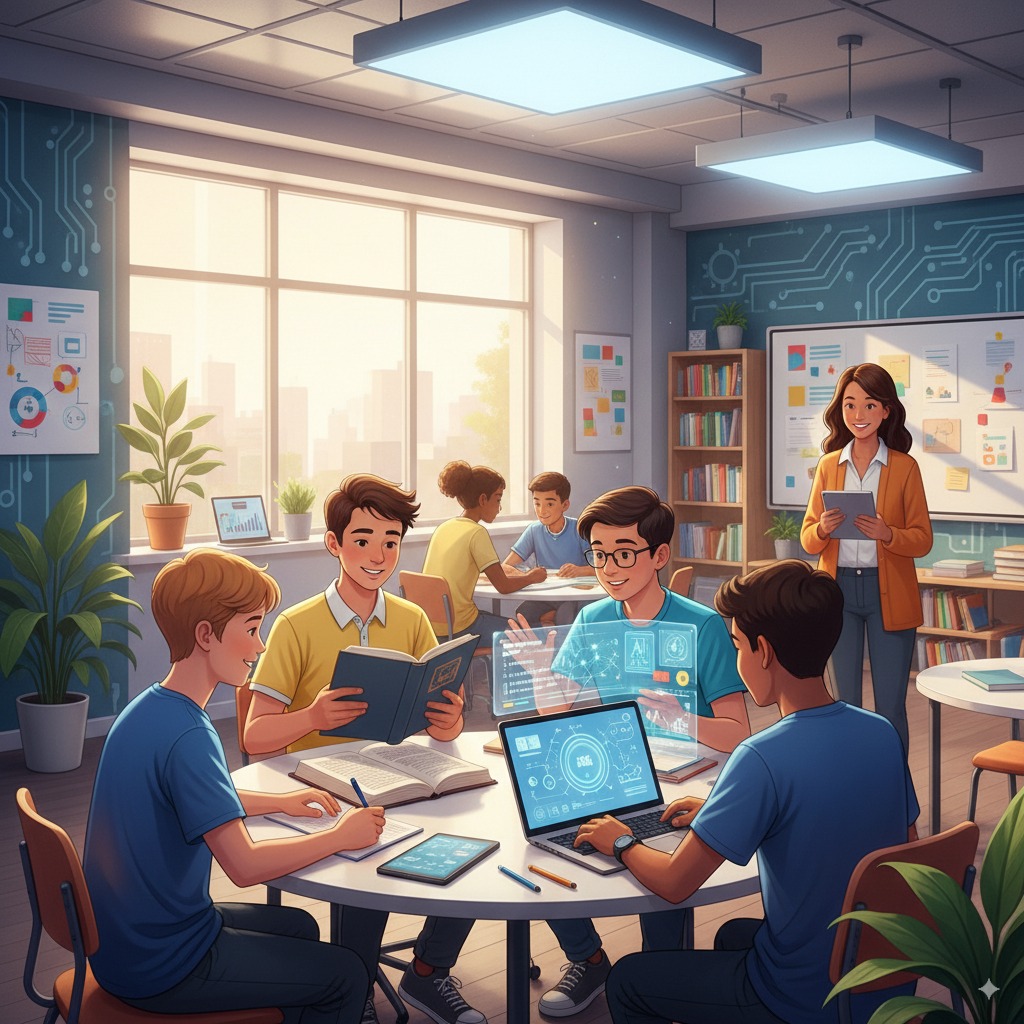
As an educator who works with teenagers daily, I understand your concerns about AI’s impact on your child’s future. Let me share why education remains more crucial than ever.
Dear Parents,
I hear the questions in parent-teacher conferences, see the worry in your emails, and feel the uncertainty in hallway conversations: “With AI doing so much now, does my teenager really need to work so hard in school?” It’s a fair question, and one that deserves a thoughtful answer from someone who spends every day helping young people navigate their futures.
The Truth About AI and Your Teen’s Future
Here’s what I’ve learned from watching how today’s students interact with technology: AI doesn’t make education obsolete—it makes the right kind of education absolutely essential.
Think of AI as a powerful tool, like a calculator or word processor. Your teen still needs to understand math concepts to know when the calculator’s answer makes sense. They still need strong writing skills to create compelling content, even with AI assistance. The tool amplifies their capabilities, but only if they have capabilities to amplify.
What Your Teen Really Needs to Succeed
Critical Thinking That Can’t Be Automated
Every day, I watch students encounter information online—some true, some false, some somewhere in between. The teenagers who thrive are those who can ask the right questions: “Where did this come from? Does this make sense? What’s missing from this picture?” These skills come from wrestling with complex texts in English class, debating different perspectives in history, and learning to evaluate evidence in science.
The Human Skills That Matter More Than Ever
In my classroom, I see which students naturally become leaders on group projects, who can resolve conflicts, and who can explain complex ideas to their peers. These aren’t skills AI can teach or replicate. As AI handles more routine tasks, your teen’s ability to communicate, collaborate, and connect with others becomes their competitive advantage.
Adaptability Built on Strong Foundations
The students I’m most confident about aren’t necessarily the ones with the highest test scores—they’re the ones who can learn new things quickly. When I introduce a new concept or ask them to tackle an unfamiliar problem, they draw on their broad knowledge base to make connections and find solutions. This adaptability comes from a well-rounded education, not from shortcuts.
Preparing Your Teen to Use AI Wisely
Rather than competing with AI, we need to prepare students to be its best collaborators. This means:
Teaching AI literacy alongside traditional subjects. Your teen needs to understand how AI works, its limitations, and when to trust (or question) its outputs. They should know how to craft effective prompts and verify AI-generated information.
Emphasizing the learning process, not just the end result. When students struggle through a challenging math problem or craft multiple drafts of an essay, they’re building mental muscles that AI can’t build for them. The struggle is where the learning happens.
Developing ethical reasoning. AI tools raise new questions about academic integrity, privacy, and fairness. Students need practice thinking through these dilemmas now, while the stakes are still relatively low.
What This Means for Your Family
You don’t need to become an AI expert overnight, but you can support your teen by:
- Encouraging curiosity over convenience. When your teen uses AI for homework help, ask them to explain what they learned, not just what they produced.
- Modeling lifelong learning. Show your teen that you’re also adapting to new technologies and learning new skills. This normalizes the idea that learning never stops.
- Supporting productive struggle. When your teen finds schoolwork challenging, resist the urge to suggest they “just use AI.” The difficulty is often where the most important learning happens.
The Bigger Picture
Your teenager is growing up in a world where human creativity, judgment, and connection will be premium skills. The students who will thrive aren’t those who avoid learning because AI exists—they’re the ones who use their education to think more creatively, solve more complex problems, and lead more effectively than any previous generation.
Education has always been about more than job preparation. It’s about raising thoughtful citizens who can navigate complexity, contribute to their communities, and find meaning in their work. In an AI-driven world, these goals become even more important.
Moving Forward Together
As educators, we’re not just teaching your teens facts and formulas—we’re helping them develop the judgment to use powerful tools wisely, the creativity to solve problems AI can’t even identify, and the human skills that will always be irreplaceable.
Your concerns about AI’s impact are valid, but the solution isn’t less education—it’s better education. Education that prepares your teen not just to live in an AI world, but to help shape it for the better.
Trust the process, support the struggle, and remember that the goal isn’t to compete with AI—it’s to raise young people who can partner with it to build a better future.